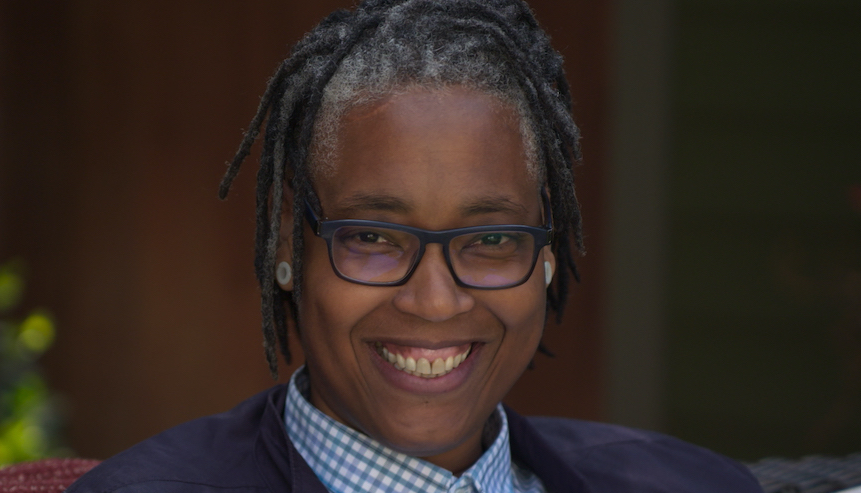Every Body opens with a montage that inspires delight and horror in equal measure: Pink and blue smoke, glitter, dyes, frosting, and more burst forth on the screen, as expectant parents announce their coming bundle of joy’s gender. For Oscar-nominated filmmaker Julie Cohen (RBG), these gender reveals offered the perfect way to contextualize what her latest film is all about. Her focus with Every Body is on intersex people, individuals whose sexual or reproductive anatomy transcends the strictures of those rigid male|female boxes and who have been, and continue to be, mistreated by the medical establishment.
“The kind of the jumping off point for this story is a soundbite that comes from one of our stars, Sean Saifa Wall, where he says, ‘You know, we live in a world that’s so binary. So where does an intersex person like me fit in?’” says Cohen, in San Francisco with producer Ted Nguyen and another of her subjects, actor-filmmaker River Gallo for a Pink Saturday Frameline screening of Every Body at the Castro Theater.
“That is basically the question that launches our whole film. To set that up and maybe have a little fun, our awesome editor Kelly Kendrick cut together an amusing montage of gender reveals to set up the notion that we live in a society that I would argue is overly binary. I think the gender reveals, which are horrifying but also have a sweetness to them—that’s just the way the parents are celebrating the reality of their coming child— unfortunately, become all about the gender of the baby, which shouldn’t be the point.”
The documentary, now playing in Bay Area theaters, adds plenty of historical and medical context to its subject matter, the “I” in LGBTQIA, but its major lens is on the activists who share their stories, Wall, Alicia Roth Weigel, and Gallo. Wall and Weigel were already part of the film when Gallo joined them at an action demanding that Weill-Cornell, an institution that is part of New York’s Presbyterian Hospital, stop performing unnecessary surgeries on intersex children. It was Gallo’s first time at a protest.
“I just let out a lot of pent up rage that I had over the doctors in the medical establishment,” Gallo, the first out intersex filmmaker who recently completed their first feature film, Ponyboi, says. “I think that piqued Julie’s interest.
“I had a lot of reservations at first just because I’m an actor and was a bit uncomfortable at the thought of just being myself and talking about all the vulnerabilities around growing up intersex in a nonfiction format and allowing a filmmaker to then take control of that narrative. But I said yes, and I just know that for me, any opportunity to share my story is a form of activism. Just because there are, by and large, not many people that are out as intersex and I know that has a lot of societal and cultural significance and power.”
Cohen recalls an intersex activist telling her that if only the pregnancy primer What to Expect When You’re Expecting included a chapter explaining intersex as just one more genetic variation among humans the world might be a very different place. Instead, we are still stuck in a timeline where intersex characteristics are treated as something to be fixed, the pressure to go along with the medical establishment applied to uncomprehending and frightened parents.

“In the Western world, there’s a desire to categorize things, make straight lines, put things into boxes,” says Cohen. “I think actually, a lot of us are uncomfortable with those boxes, and that the desire to create these very strict, confining rules has caused all kinds of damage over the years but has been particularly damaging to intersex people. Rather than being told, ‘Oh, your child has been born with a variation that actually is not unique that others have as well and that there’s all kinds of way we can raise a child in a healthy sustaining way,’ they’re told, ‘There’s a terrible problem here. We need to fix it ASAP.’”
“You know, at 16 I was forced to have surgery to implant prosthetic testicles in me—I was born without testicles—and then was forced to undergo testosterone replacement therapy,” Gallo adds. “At 16, I had this unconventional surgery and the joke of it all would be that later on I would identify as nonbinary and trans feminine and so I didn’t really need prosthetic testicles. If anything, the surgery actually gave me gender dysphoria and is also a reminder of a decision that was not made with the all the information and without my consent. So, it’s really reprehensible and I just wouldn’t want anyone subjected to that.”
Cohen found the experience of making Every Body to be unlike any other in her career. The director of Gabby Giffords: Don’t Back Down and My Name Is Pauli Murray is used to thinking in terms of what kind of arc she is building with her verité elements. Where is the film’s big climax going to land? This time, Cohen found her film on the first day of shooting when Gallo walked in to join the Weill-Cornell protest.
“It was clear seeing the activists join together and do a demonstration and talk really, really loudly, in River’s case, with a bullhorn about their own body in a way that showed that they now understood that they had nothing to be ashamed about, but they did have something to be angry about, like the whole process of coming together and speaking up for their rights was so powerful that I’m like, ‘No, this is weird, because we just started but this is actually the big end of the film. It’s not really about what battles they win or not. It’s about the power of having the fight in the first place and joining together to fight for one’s own rights and the rights of others.’
Cohen adds, “River says it in the film. We’re on the brink of a revolution here. As a filmmaker, I hope this doc is part of that. But it was happening already.”
EVERY BODY is now playing in Bay Area Theaters.






